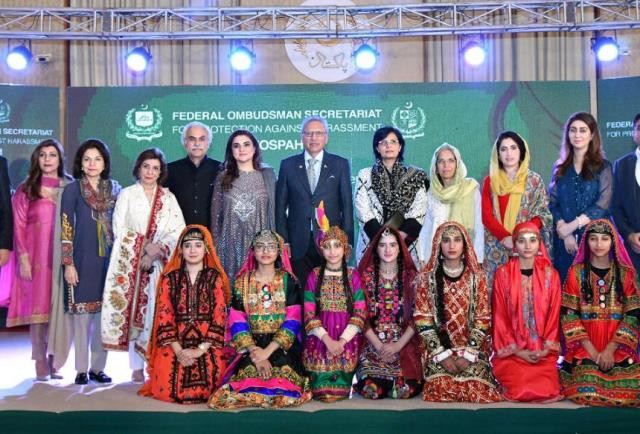UN labels 2020 ‘Generation Equality’
The global body enables women to influence decisions about future, says UN Women executive director

President Arif Alvi poses with a group of women, including Kashmala Tariq. PHOTO: EXPRESS
According to a statement issued by the organization, the executive director noted that we would call the year of ‘Generation Equality’.
“We are marking 25 years of implementation of Beijing Platform for Action as we are mobilising women’s rights with the leadership of females in civil society,” said Phumzile.
The statement added that the United Nations enabled women to influence decisions about their future besides Generation Equality which assisted to tackle issues of women belonging to all generations, including girls and elderly women.
The United Nations highlighted that currently, women are concerned about the future because of lack of equality across the world.
However, the statement added that people had positive changes in lives to celebrate.
“Since 2000 there has been a 38 per cent decline in the ratio of maternal death,” said the executive director.
Citing the facts, the statement added that legislation against discrimination of women was initiated 25 years ago and today, 131 countries have legal reforms addressing discrimination and supporting gender equality.
Adding more facts about legislation against women harassment across the world, Phumzile said in the statement that three-quarters of countries across the world had laws against domestic violence in place.
However, Phumzile expressed dissatisfaction with the progress stating that no country has achieved gender equality despite efforts.
Besides harassment and gender equality, the executive director also talked about women education adding that more girls as compared with men were in tertiary education across the world.
But she added that one out of 10 young women was unable to read and write despite improvement in enrolment.
“This has to be changed in order for girls to fully own their power, take their place in the world, and play their vital role in technology and innovation,” said the executive director.
Talking about women in leadership roles, Phumzile regretted lack of women on legislative positions as three-quarters of parliamentarians across the world were men.
She suggested that legally bind quotas to be introduced for women representation in the legislature as 80 countries have successfully done that and a few countries have gender-balanced cabinets and explicitly feminist policies.
The executive director emphasised to achieve the target of more female high-level positions in both the public and private sectors because more women were graduating from universities.
However, citing the figures, she said, “Only 27 per cent women hold managerial positions across the world.”



















COMMENTS
Comments are moderated and generally will be posted if they are on-topic and not abusive.
For more information, please see our Comments FAQ